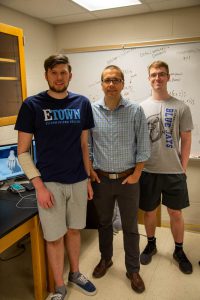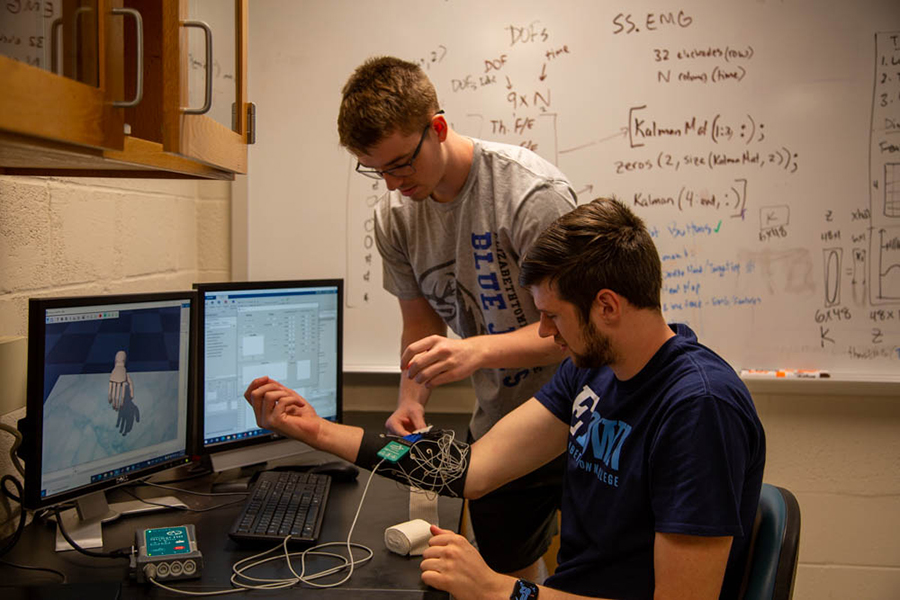Current prosthetics are limited in movement, which can make everyday tasks a challenge for users. That’s why Elizabethtown College Engineering students Alex Kobilnyk ‘23 and Nathan Griffin ‘23 are working toward a goal of making prosthetics more affordable and easier to use through the use of a real-time, realistically controlled virtual arm.
The independent student research and collaboration with an Etown faculty mentor, is part of the Summer Scholarship, Creative Arts and Research Projects (SCARP) program.
Title of Research
Real-time control of a virtual arm
Student Researchers
Nathan Griffin ‘23 – Computer Engineering
Alex Kobilnyk ‘23 – Mechanical Engineering major
Faculty Mentor
Mark Brinton, Assistant Professor of Engineering
What are you researching?
Nathan: My research involves setting up hardware and software to enable a user to control a virtual prosthetic arm by using muscle signals and continuous (e.g., real-time) decoding algorithms. 
Alex: My main contributions to this project are the fabrication of the electrode sleeve and creating the training file for mimicking the virtual hand. The training file is what we load to the virtual hand so that the hand can perform all the finger and wrist movements for us to mimic.
Why did you choose this topic?
Nathan: I like to help people in any way that I can and this was a great opportunity to mesh my concentration of engineering with another to hopefully help at least one person in the future.
Alex: I chose this topic because I wanted some experience in the electrical engineering field. Also, I wanted to gain exposure to coding in MATLAB (a programming and numeric computing platform used by engineers and scientists to analyze data, develop algorithms, and create models).
What is the most interesting aspect of this research?
Nathan: Being able to see the progress that you made, especially on the real-time control of the virtual hand. Seeing it get better and better at matching my hand on the screen.
Alex: The most interesting aspect of this research is the human-machine connection. Being able to see a virtual hand move in real-time with an actual human hand is pretty cool.
How has Professor Brinton helped you throughout this experience?
Nathan: Dr. Brinton has been very helpful to me throughout this research. He is there to answer any questions that I have and his prior knowledge in the field has helped me understand how useful something like this can be.
Alex: Dr. Brinton has taught me important project management and software development skills.
Hear from the Faculty Mentor – Professor Mark Brinton
“This project required innovative thinking, detailed understanding of a virtual prosthetic arm, and proficiency in MATLAB programming. When developing the 32-channel electrode sleeve we ran into some technical challenges that Alex and Nathan resolved through creative thinking and working with Mark Gatti (Manager of Engineering Laboratories & Student Fabrication) in the Fabrication Lab.
“SCARP provides a research experience for students to grow both academically and personally by developing new skills, overcoming obstacles, and making deeper social connections. I really like how SCARP provides students not only with a research experience but also training and an opportunity to present their work. I have enjoyed getting to know the students in a more relaxed environment and accomplishing our goals together.”

